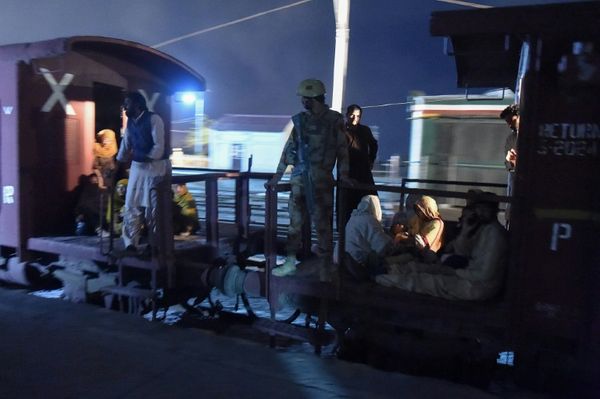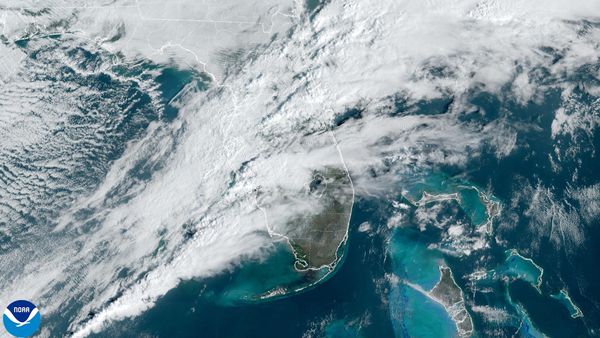When Julie Postma was diagnosed with multiple sclerosis as a teenager, she was told she would be unable to walk by the time she turned 30.
More than two decades later – at age 53 — Julie has defied expectations, recently representing Australia in an international World Cup sport climbing competition in Salt Lake City.
"When I was diagnosed, it was, 'You have a disability, you just go and sit in a box' and the world ignores you," Julie says.
"So this has been about going back and doing those things that I never had the opportunity to do when I was younger.
"I was thrilled. I definitely climbed my best."
After getting into climbing as a fun form of physiotherapy a few years ago, Julie is now a member of Australia's national paraclimbing team.
Despite having no funding nor formal support, the team is the most successful the country has ever seen.
And, with a majority-female squad, women are leading the way, propelled by a volunteer-run climbing group for people with disabilities.
Australia has secured its first World Cup climbing medal
With its dizzying heights and gravity-defying physicality, the adventurous sport of rock climbing may seem ill-suited to people living with a disability.
Melbourne scientist and below-knee amputee Sarah Larcombe has recently proven just how wrong that is.
In her international competition debut alongside Julie in May, Sarah won Australia's first ever World Cup medal and, to top it off, it was a gold medal.
"I was physically shaking from nerves," the 34-year-old says.
The win came after almost two years of intense physical training and months of fundraising.
"[It] was pretty difficult. It's a massive financial cost. The para-athletes are expected to be self-funded for these competitions," Sarah says.
"Being disabled is expensive in itself. We have a lot of extra expenses that, I think, most people wouldn't have to deal with."
Despite having to resort to a credit card to get there, Sarah says the sacrifices have been worth it.
"Climbing just feels so freeing, especially having a disability and feeling confined within your own body," she says.
"Getting on a climbing wall allows you to do things that you never thought you would be able to do … It's like solving a puzzle with your body."
Sarah is a member of Adaptive Climbing Victoria (ACV), a grassroots group founded in 2018 to help more people with disabilities experience rock climbing, both indoors and outdoors.
The organisation's mantra is that everyone — no matter their ability — can climb.
ACV chair Araminta "Minty" McLennan — who was born with cerebral palsy — says rock climbing, by its nature, is an adaptive sport because there is no one "right" way to climb.
"It doesn't matter how you get to the top, as long as you get to the top, people are happy," Minty says.
Minty says ACV's mission is to transform perceptions and attitudes towards disability.
"It's adjusting attitudes of ourselves and of the wider climbing community to help make more space for people with disabilities," she says.
The group runs events and programs for people with disabilities at climbing gyms and outdoor crags, with a team of volunteers adapting the climbing set-up to the needs of the individual climber, using specialised equipment and a helping hand.
Educating and working with climbing facilities so they can make space for people with disabilities to participate safely is another way the group is working to improve accessibility and inclusivity.
"Not only so that the people who are climbing feel safe, but also so the venue feels safe, facilitating that," Minty says.
After discovering climbing was a perfect way to leverage her "comically strong upper-body strength", Minty says the benefits went far beyond the physical, giving her a sense of belonging and place in a welcoming community.
"I often say that climbing is the friendliest cult you will ever join … it becomes critical to the fabric of your life in many ways," she says.
"It had such an incredible impact on my life. I just want to be able to share that."
Paralympic dreams on the horizon
Like Sarah and Julie, Minty is on the national paraclimbing team. She's preparing to fly out to Europe for her first World Cup next week.
Her big dream, though, is the Paralympics.
"It's definitely my big, hairy audacious goal," the 28-year-old says.
"The official party line is that it's slated to be included at the Los Angeles Olympics in 2028, so that gives me a few years."
While Sarah says she may be a little too old by 2028, she hopes her success will help raise awareness about the fledgling sport of paraclimbing and inspire other young girls living with a disability to dream big.
"Growing up … there wasn't a lot of visibility or representation of disabled athletes — or just disabled people in general — in the media at that time," Sarah says.
Julie has been sidelined for the rest of this year's international competitions by a bout of COVID-19, but the mother-of-two is hoping to make it to next year's world championships.
"Having a degenerative and progressive condition can be hard because, in your heart, you know it's only going in one direction … a gradual decline over an extended period of time," Julie says.
While in the past year the progression of her MS has meant she now uses a wheelchair much of the time, her climbing has continued to get better.
"To have something that I've been able to work at — and keep improving at, and doing better at, despite the body getting worse every year — has been really nice."
Julie's advice for anyone, no matter their age or impairment, is to just go for it: "Don't let people tell you, 'No' or 'You can't', if you really want to do it, do it."







